Good People,
Re: South Sudan Peace talks open as Battles rage in Capital
Situation in South Sudan is sad, unfortunate and ugly to even
think there is opening for truce. This Civil War in South Sudan
was authored and Engineered by IGAD for the benefit of their
business network and never took those of the South Sudan people
into consideration, which is why, the International Community for
Human Rights must step in as a go between.
Evidence of which Uganda Private Army of more than 150 Army
personnel from Kampala are holed up inside South Sudan.
It is about time the world put IGAD and Museveni to explain what
Uganda Army is doing in South Sudan and equally explain how
they reached the consensus that the people of South Sudan should
be invated????
From reliable sources, it is rumoured that political prisoners held
by Kiir had been killed by IGAD.......which is why IGAD are beating
about the bush about the South Sudanese prisonners be re-located
to IGAD, how was that done????? Can Kiir confirm that????
Can they produce them first for the world to believe??? What a bad
conspiracy the IGAD had cooked....This is troubling and worisome.
This matter cannot continued to be handled by IGAD......Let the music
begin..................
Judy Miriga
Diaspora Spokesperson
Executive Director
Confederation Council Foundation for Africa Inc.,
USA
http://socioeconomicforum50.blogspot.com/
Diaspora Spokesperson
Executive Director
Confederation Council Foundation for Africa Inc.,
USA
http://socioeconomicforum50.blogspot.com/
=========
South Sudan Won’t Bow to Pressure to Release Political Prisoners
South Sudan peace talks open as battles rage in capital
AFP
By Waakhe Simon Wudu in Juba and Jacey Fortin in Addis Ababa
Saturday, 4th 2014 .............hours ago
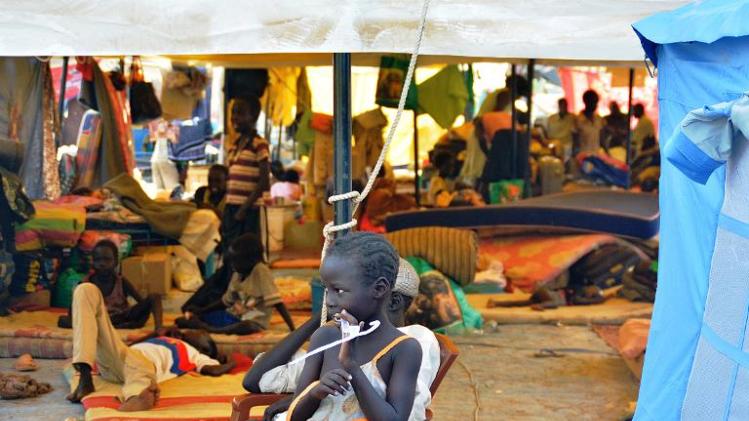
Juba (AFP) - Artillery fire pounded Juba's government district Saturday even as warring factions met for the first time on the eve of direct talks in Ethiopia to pull South Sudan back from the brink of all-out civil war.
Full face-to-face peace talks were to begin in earnest on Sunday in the Ethiopian capital in a bid to end three weeks of fighting that are feared to have killed thousands in the world's newest nation.
"South Sudan deserves peace and development not war," Ethiopian Foreign Minister Tedros Adhanom said at ceremony to formally open talks, which brought the government and rebel teams together for the first time.
"You should not allow this senseless war to continue, you need to stop it, and you need to stop it today -- and you can."
As delegates smiled in the luxury hotel in Ethiopia, heavy explosions from artillery fire and the rattle of automatic weapons were heard in a Juba district where most ministries, the presidential palace and the parliament are located, an AFP reporter said.
It was not clear who was involved in the fighting, that ended a period of relative calm in the capital.
The conflict erupted on December 15, pitting army units loyal to President Salva Kiir against a loose alliance of ethnic militia forces and mutinous army commanders nominally headed by his rival, former vice president Riek Machar.
Negotiation teams have spent three days in the same luxury hotel in neighbouring Ethiopia's capital Addis Ababa.
Ethiopian foreign ministry spokesman Dina Mufti said full formal direct talks would begin at 1200 GMT on Sunday.
Peace by 'all means' necessary
"The people of South Sudan have suffered in the fight for independence, and they will not suffer again in our hands," said Nhial Deng Nhial, head of the government negotiation team.
"We shall leave no stone unturned in the search for a peaceful resolution."
But Nhial also warned it "must be abundantly clear" the government has "an obligation to restore peace and security of the country through all means available."
Fighting has spread across the world's youngest nation, with the rebels seizing several areas in the oil-rich north.
Rebel delegation chief Taban Deng, a former governor of the key oil-state Unity, said they were committed to the talks mediated by the regional East African IGAD bloc of nations.
"We will be continuing move to the next level," Deng said, including negotiating ceasefire and "political issues."
Deng demanded the release of several top political leaders from the ruling Sudan People's Liberation Movement (SPLM), accused of involvement in the violence, that began in an alleged coup attempt.
"The absence of democracy in the SPLM and a lack of dialogue within the SPLM has led to the current problems we are facing today," Deng said.
"We are asking for the release of the detainees. They are detained not for any crime they have committed, but for voicing their opinions in the SPLM."
Aid workers have stepped up warnings of a worsening crisis for civilians affected by the conflict in the landlocked country of almost 11 million people.
The army continued Saturday to battle rebels in a bid to wrest back the strategic town of Bor, capital of Jonglei, one of the country's largest states.
"Our forces are still moving towards Bor," army spokesman Philip Aguer told AFP, dismissing rebel claims they had been marching on Juba.
Civilians in critical condition
There were reports of intense battles involving tanks and artillery on the outskirts of Bor, which has already exchanged hands three times since fighting began.
The US embassy in South Sudan ordered a further pullout of staff on Friday because of the "deteriorating security situation", although Washington -- a key backer of the fledgling state -- insisted it remains committed to ending the violence.
The ongoing fighting prompted the top UN aid official in South Sudan, Toby Lanzer, to warn that soldiers and rebels must protect civilians and aid workers.
He announced Saturday that the UN peacekeeping force (UNMISS) would be "reinforcing its presence" in the country.
IGAD, the Inter-Governmental Authority on Development, whose members include the talk's host Ethiopia as well as Kenya and Uganda -- all strong backers of Kiir's government -- played key roles in pushing forward the 2005 deal that ended Sudan's two-decade-long civil war.
"If you put your people and country above any personal ambitions, surely you can stop the war," Tedros added.
Fighting started in oil-rich but impoverished South Sudan when Kiir accused Machar of attempting a coup.
Machar denied this, in turn accusing the president of conducting a violent purge of opponents.
The violence has forced around 200,000 people to flee their homes and "affected many hundreds of thousands of people indirectly", the UN's Lanzer said. Tens of thousand are seeking refuge with badly overstretched UN peacekeepers.
The UN peacekeeping force said this week that atrocities are continuing to occur throughout South Sudan, which won independence from Sudan in 2011 after decades of civil war.
The conflict has been marked by an upsurge of ethnic violence pitting members of the Dinka tribe that Kiir comes from against the Nuer people of Machar.
Bigdaddy
Politicians are businessmen that are after the wealth of that nation that have no interest in the development and progress of their citizens. They united to divide Sudan and their greed keeps them fighting each other. Are they better than Bashir of Sudan now? A new and young nation like this should have been build on secularism, transparency and rules of law. Allowing sectarianism to rear its head is a disaster that would set this nation more backward. What South Sudan needs is strong and transparent leadership that is ready to put South Sudan economy development in its first agenda. Power tussle that would give room to extremists should be averted.
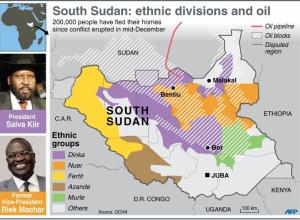
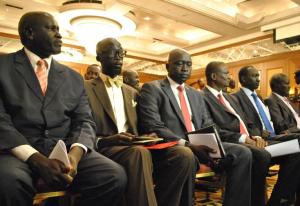
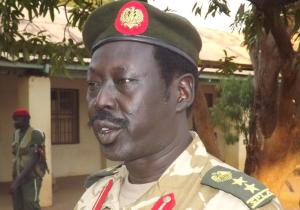
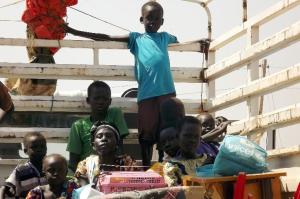
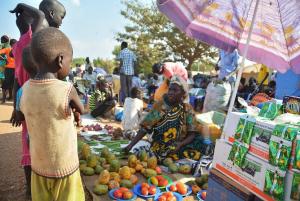
No comments:
Post a Comment